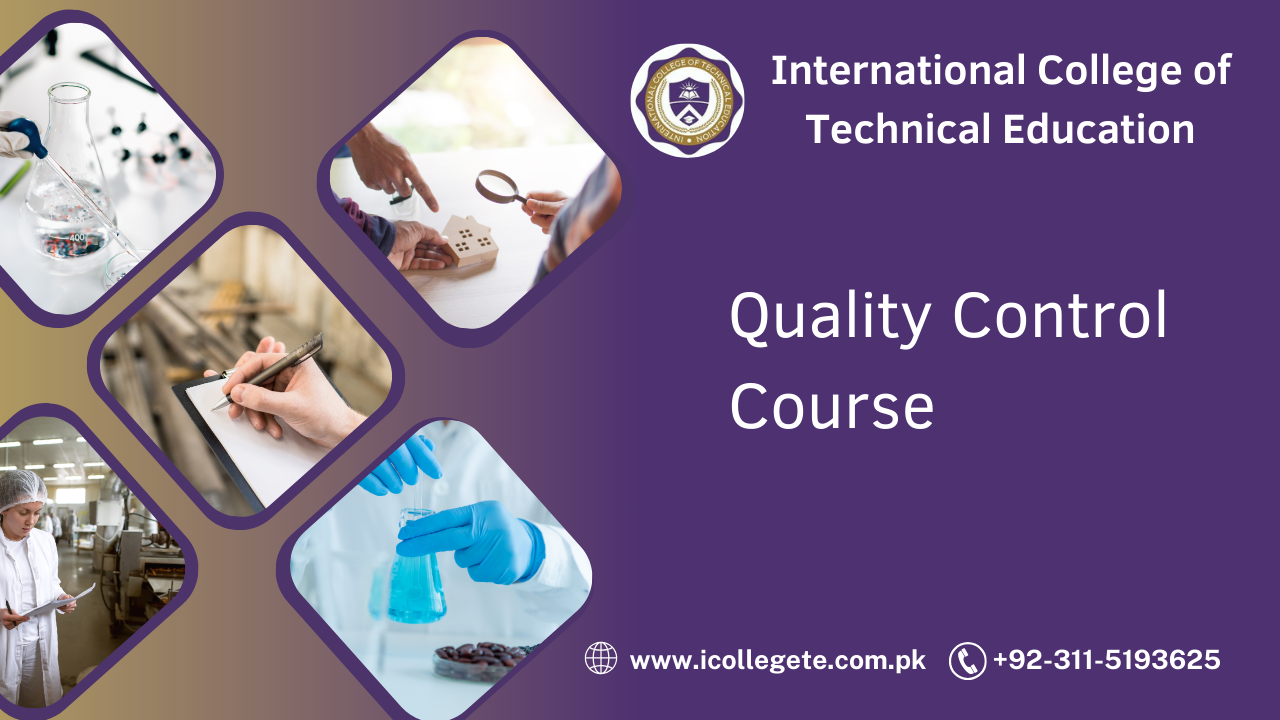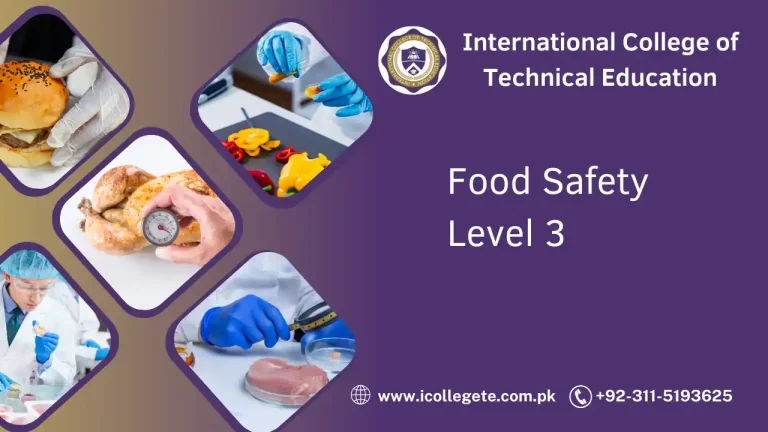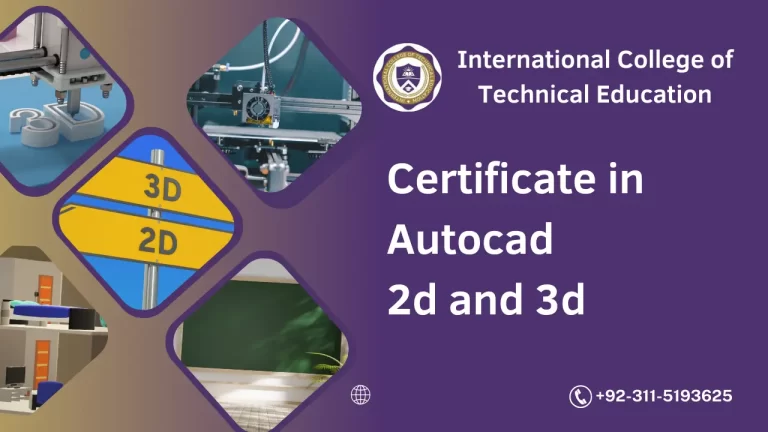In today’s competitive market, businesses are under constant pressure to deliver high-quality products and services. A Quality Control (QC) course can be the key to ensuring that companies meet these demands by systematically monitoring and maintaining product standards. The Quality Control Course in Sargodha provides the skills and knowledge required to ensure products meet required standards, improving both customer satisfaction and business profitability.
The Quality Control Course in Sargodha is designed for individuals interested in learning how to maintain, monitor, and improve the quality of products or services in various industries. The course provides a thorough understanding of the concepts, techniques, and methodologies used in quality control to ensure that goods and services meet the required specifications and standards. Students will learn the principles of quality assurance, defect prevention, inspection, testing, and the importance of maintaining a quality management system.
The course prepares students for critical roles in quality control departments within organizations across a variety of sectors, including manufacturing, construction, and food production.
Course Overview
This course is a detailed study of the principles and practices involved in quality control, emphasizing the tools and techniques that professionals use to maintain high standards. The course covers both theoretical knowledge and practical applications of quality control concepts, such as process control, inspection methods, and quality improvement strategies. It also focuses on the importance of quality standards and how they are applied in different industries.
Throughout the course, students will develop an understanding of the tools used in quality control, such as statistical analysis, Six Sigma, Total Quality Management (TQM), and other techniques used to identify, prevent, and resolve defects.
Study Units
The Quality Control Course in Sargodha typically includes the following study units:
- Introduction to Quality Control
- This unit covers the basic concepts and history of quality control, including the importance of quality in industries and the impact on business success. Students will learn about the role of quality control in improving production processes and meeting customer expectations.
- Quality Standards and Specifications
- An introduction to quality standards such as ISO 9001, industry-specific guidelines, and national and international quality frameworks. Students will also learn how to interpret and implement quality specifications in various production environments.
- Quality Control Tools and Techniques
- This unit provides practical training on the tools and techniques used in quality control, such as control charts, Pareto analysis, fishbone diagrams, and statistical process control (SPC). These tools help in identifying, analyzing, and resolving quality issues in the production process.
- Inspection and Testing Methods
- Students will learn about the different inspection techniques used to ensure products meet required specifications. This includes visual inspection, dimensional testing, and the use of automated inspection systems. Testing methods for various industries will also be explored.
- Process Control and Monitoring
- In this unit, students will learn about process control and how to monitor production processes to ensure they remain within set parameters. Techniques for process improvement and minimizing variability will also be covered.
- Quality Improvement Strategies
- A key aspect of quality control is continuous improvement. This unit will cover methods like Six Sigma, Lean Management, and Kaizen, which help organizations improve their processes and reduce waste, defects, and inefficiencies.
- Root Cause Analysis and Problem Solving
- Students will learn how to identify the root causes of quality problems and implement solutions using tools like the 5 Whys and fishbone diagrams. The emphasis will be on preventing defects and continuously improving product quality.
- Documentation and Reporting
- In this unit, students will learn about the documentation involved in quality control processes. Proper reporting and record-keeping are essential to track progress, ensure accountability, and demonstrate compliance with quality standards.
- Quality Management Systems (QMS)
- This unit introduces students to the concept of a Quality Management System, focusing on frameworks like ISO 9001. Students will learn how to implement and maintain a QMS within an organization to ensure consistent product quality.
Learning Outcomes
Upon completing the Quality Control Course in Sargodha, students will be able to:
- Understand the fundamental concepts and importance of quality control in various industries.
- Interpret and apply national and international quality standards and specifications.
- Utilize quality control tools and techniques to monitor and improve production processes.
- Conduct inspections and tests to ensure products meet the required standards.
- Apply process control methods to minimize defects and variations in production.
- Implement continuous improvement strategies like Six Sigma and Lean Management to enhance product quality.
- Perform root cause analysis and solve quality-related problems effectively.
- Document and report quality control activities in accordance with industry standards.
- Understand and implement quality management systems (QMS) to ensure long-term product quality.
Course Benefits
- Industry-Ready Skills: Students gain practical, hands-on experience in quality control methods, preparing them to handle real-world challenges in any industry.
- Global Recognition: Understanding and applying international quality standards, such as ISO 9001, enhances students’ employability in companies that operate globally.
- Versatility: The skills learned in this course are applicable to a wide range of industries, from manufacturing to food processing, construction, and more.
- Career Advancement: The course prepares students for roles in quality control departments, offering the potential for career advancement as they gain experience and take on leadership roles.
- Improved Problem-Solving Skills: By learning about quality improvement strategies and root cause analysis, students become proficient in identifying and solving quality-related problems, a skill that is highly valued in any industry.
- Enhanced Employability: With quality control being an essential function in modern industries, completing this course will make students more attractive to employers seeking professionals who can ensure product quality and maintain high standards.
Who Is This Course For?
The Quality Control Course in Sargodha is ideal for:
- Aspiring Quality Control Professionals: Individuals who want to begin a career in quality control or those seeking to enhance their understanding of quality management systems and processes.
- Manufacturing Industry Workers: Those working in the manufacturing or production sectors who want to formalize and deepen their understanding of quality control principles.
- Engineering Graduates: Recent engineering graduates interested in quality control as a specialization within their field.
- Existing Quality Control Employees: Professionals already working in quality control but looking to refine their skills and knowledge to advance in their careers.
- Entrepreneurs: Individuals who wish to start their own business in a sector where product quality is a key differentiator, such as food processing, textiles, or consumer goods.
- Business Managers: Managers who oversee production or operations and need to ensure that quality control measures are integrated into their business processes.
Future Progression
After completing the Quality Control Course, graduates can pursue various career opportunities in the quality control and assurance field, including:
- Quality Control Inspector: Responsible for inspecting products to ensure they meet specified quality standards.
- Quality Assurance Manager: Oversee the quality control department and ensure that processes and products meet industry standards.
- Process Improvement Specialist: Focus on improving production processes, reducing waste, and enhancing efficiency through strategies like Lean and Six Sigma.
- Production Manager: Manage production lines and teams, ensuring that quality standards are maintained throughout the production cycle.
- Quality Control Consultant: Work as an independent consultant, advising companies on quality management systems and helping them improve their operations.
- Compliance Officer: Ensure that an organization is adhering to industry standards and regulations regarding product quality and safety.
- Research and Development (R&D) Specialist: Work in R&D departments to develop and test new products while ensuring they meet quality standards.
Graduates can also pursue advanced certifications in specialized areas of quality control, such as Six Sigma Green Belt or Black Belt, Total Quality Management (TQM), or ISO certifications, to further enhance their career prospects.
The Quality Control Course in Sargodha offers a comprehensive and practical understanding of the principles and practices required to ensure high-quality products and services. Whether you’re looking to start a career in quality control, enhance your skills, or take on managerial roles in the field, this course provides a solid foundation for success. With a growing emphasis on quality across industries, professionals with expertise in quality control are in high demand, making this course an excellent investment for your career.







